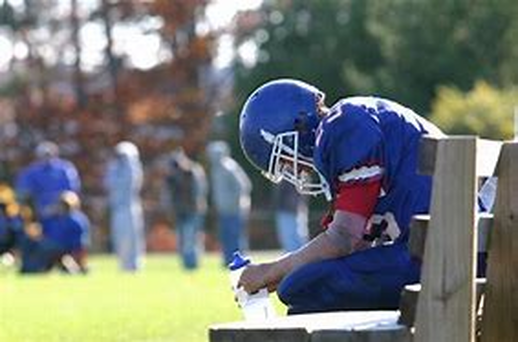By: Avery O'quinn
An American study regarding student-athletes participating in the NCAA, between 10 and 15%, will experience psychological issues severe enough to need counselling. which is 2% higher than their nonathletic peers. when Logan Montford (a varsity soccer player at Hillgrove high school) was asked about how being a student athlete affected her mental health, she said “personally, when I was younger I cared more, bad games would ruin a week, I would overthink every little mistake, and always had this mindset that I wasn’t good enough, as I grew up more, I learned how to deal with these feeling better, but they still linger.” Athletes are exposed to this mindset of never being good enough and always being told to work harder by coaches, parents, and teachers at such a young age. It makes young kids grow up doubting themselves, and they must teach themselves how to take pride in themselves when they get older.
It’s a fact that student athletes feel more pressure than many of their peers, in the NCAA handbook it states, “An athlete’s self-esteem and identity may be negatively affected by their inability to do the thing that they enjoy and do best.” Athletes deal with immense amounts of stress at such a young age. Many athletes quit so young because of how burnt-out they are from the constant stress that comes with being a student athlete. When speaking on this subject, Braxton Powell said, “The constant need to do better in both school and wrestling is mentally draining, and always feeling like I’m not doing enough and pushing myself to the point of my body being in pain, is physically draining”. With pressures to perform well in games, as well as in the rest of their lives, being an athlete can be incredibly draining for a person’s mental health. Student-athletes also have pressures to maintain their homework and grades on top of practice and games.
Many athletes would say the sport they plays is a big part of their identity, for example, Clarabelle Canady says, “soccer plays a huge part on who I am, I’ve spent my whole childhood playing soccer, I wouldn’t know who I am without it.” When athletes consider a sport as a part of their identity, the last thing they want to do is give that sport up to recover from an injury. Athletes often push themselves to the breaking point for their bodies before giving themselves a break. Many athletes will push themselves to play through an injury, when asked why Logon Montford said, “I have played through many injuries, because personally I didn’t want it to hold me back, I felt like I was losing skills sitting around while my teammates were practicing.” While injuries are an unavoidable part of sport participation, they become a real Burdon on the mind and spirits of an athlete. Injuries could cause depression, disordered eating, anxiety, anger and low self-esteem, particularly in competitive injured athletes. When athletes get hurt, they are given time to heal, but when the injuries are invisible many athletes will play through the pain and hope it gets better on its own. Which majority of the time not resting your injured body just worsens injuries and pain.
For decades, mental health in athletes has been glossed over, pushed aside or covered up with a stigma put on athletes that all athletes are “tough”. Although that is true, student athletes are human too, the deserve to be heard, the deserve to be helped when its needed. They need days to be normal kids and not worry about practice later that day, or the piles of homework they need to do.
An American study regarding student-athletes participating in the NCAA, between 10 and 15%, will experience psychological issues severe enough to need counselling. which is 2% higher than their nonathletic peers. when Logan Montford (a varsity soccer player at Hillgrove high school) was asked about how being a student athlete affected her mental health, she said “personally, when I was younger I cared more, bad games would ruin a week, I would overthink every little mistake, and always had this mindset that I wasn’t good enough, as I grew up more, I learned how to deal with these feeling better, but they still linger.” Athletes are exposed to this mindset of never being good enough and always being told to work harder by coaches, parents, and teachers at such a young age. It makes young kids grow up doubting themselves, and they must teach themselves how to take pride in themselves when they get older.
It’s a fact that student athletes feel more pressure than many of their peers, in the NCAA handbook it states, “An athlete’s self-esteem and identity may be negatively affected by their inability to do the thing that they enjoy and do best.” Athletes deal with immense amounts of stress at such a young age. Many athletes quit so young because of how burnt-out they are from the constant stress that comes with being a student athlete. When speaking on this subject, Braxton Powell said, “The constant need to do better in both school and wrestling is mentally draining, and always feeling like I’m not doing enough and pushing myself to the point of my body being in pain, is physically draining”. With pressures to perform well in games, as well as in the rest of their lives, being an athlete can be incredibly draining for a person’s mental health. Student-athletes also have pressures to maintain their homework and grades on top of practice and games.
Many athletes would say the sport they plays is a big part of their identity, for example, Clarabelle Canady says, “soccer plays a huge part on who I am, I’ve spent my whole childhood playing soccer, I wouldn’t know who I am without it.” When athletes consider a sport as a part of their identity, the last thing they want to do is give that sport up to recover from an injury. Athletes often push themselves to the breaking point for their bodies before giving themselves a break. Many athletes will push themselves to play through an injury, when asked why Logon Montford said, “I have played through many injuries, because personally I didn’t want it to hold me back, I felt like I was losing skills sitting around while my teammates were practicing.” While injuries are an unavoidable part of sport participation, they become a real Burdon on the mind and spirits of an athlete. Injuries could cause depression, disordered eating, anxiety, anger and low self-esteem, particularly in competitive injured athletes. When athletes get hurt, they are given time to heal, but when the injuries are invisible many athletes will play through the pain and hope it gets better on its own. Which majority of the time not resting your injured body just worsens injuries and pain.
For decades, mental health in athletes has been glossed over, pushed aside or covered up with a stigma put on athletes that all athletes are “tough”. Although that is true, student athletes are human too, the deserve to be heard, the deserve to be helped when its needed. They need days to be normal kids and not worry about practice later that day, or the piles of homework they need to do.


